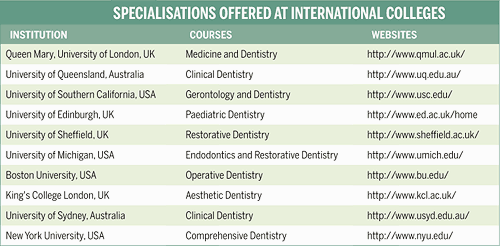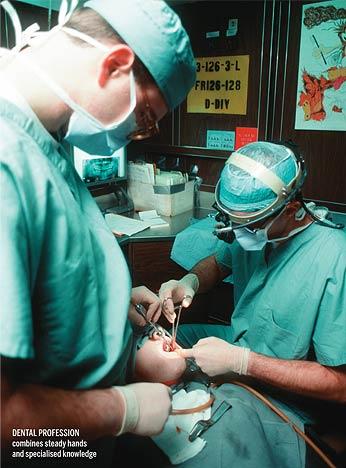Bharti M Borah
A reclining dental unit, the whirring of an air rotor and a voice that goes 'Spit please' every few minutes. Welcome to the dental clinic!
India is fast gaining ground as a hot destination to get that perfect smile at a fraction of the cost, compared to many parts of the world. So does that make dentistry a lucrative career option? Undoubtedly!
The beginning
The Bachelor of Dental Surgery or BDS, is commonly known as the science and art of addressing problems related to the teeth and jaws of human beings, though animal oral health is also a part of the large range of options in dentistry. As a student of BDS, you will receive training and education related to prevention, diagnosis and treatment of all diseases, malformations and injuries related to the mouth and its components.
Pursuing the BDS course exposes you to all aspects of dentistry, leaving no stone unturned. From creating the perfect filling, to using a range of instruments, to encountering all kinds of dental problems that you had earlier only seen in your textbooks. Remember, as a dentist, your expertise may be required in the emergency ward for a patient of head injury as well.
A person with a BDS degree can practise dentistry. After completion of the degree, many opt to join a government hospital to get hands-on experience. The inflow of patients is very high in comparison to that at private hospitals and clinics. As part of the BDS course, you will receive in-depth knowledge on topics such as health and disease, behavioural consequences of oral diseases, preventive dentistry. clinical examination and diagnostic procedures, X-rays and genetic engineering.
Eligibility
 Most medical colleges that offer the BDS course require candidates to have passed 10+2 from a recognised board with science as the main subject, this is a constant. Other criteria for eligibility may vary from college to college as do fee structures.
Most medical colleges that offer the BDS course require candidates to have passed 10+2 from a recognised board with science as the main subject, this is a constant. Other criteria for eligibility may vary from college to college as do fee structures.
Specialisation
A BDS degree alone is not considered enough to succeed in this profession. Many opt for an MDS as well, and keep participating in continuing education programmes based on their specialisations throughout practice.
Continued education is part of the terrain, no one can escape it no matter whether you are a new entrant to the profession or have spent 40 years in practice. Keeping up with the trends of open and distance learning, the Indira Gandhi National Open University (IGNOU), in collaboration with the Dental Council of India launched two programmes, a PG certificate course in Endodontics and a PG certificate course in Oral Implantology.
Many more options are available worldwide, along with short-term courses, too. Upgrading your knowledge is required, even in order to renew your license to practice on an annual basis. It's also important to stay abreast of developments in the medical field and pharmaceuticals.
Super specialisations
 Dentistry as a field is very challenging. Opting for an area of expertise such as implants, paediatric dentistry or cosmetic dentistry is not the end of the road of your growth. With more hands-on experience, many enter super specialisations in the course of their careers. Apart from practice, some dentists enter the field of education and research. It is not uncommon for dentistry colleges to invite practicing dentists to give lectures on varied aspects of the field.
Dentistry as a field is very challenging. Opting for an area of expertise such as implants, paediatric dentistry or cosmetic dentistry is not the end of the road of your growth. With more hands-on experience, many enter super specialisations in the course of their careers. Apart from practice, some dentists enter the field of education and research. It is not uncommon for dentistry colleges to invite practicing dentists to give lectures on varied aspects of the field.
Choosing a good college
When opting for a private college, choose one that has an approval from the Dental Council of India, only then will your five years of study (four years of study plus one year of internship) have weightage in the real world. Government colleges are usually preferred as a destination for studying, though the number of seats available is small, as is the number of colleges in comparison to private sector.
Getting hold of a seat in a dental college is tough. CBSE conducts an entrance examination on an all-India basis, to fill in 15 per cent of the seats. Many universities and institutes, both in the public and private sector, conduct their own admission tests.
Some of the states have evolved state-level entrance examinations to fill in seats in public institutions as well as a percentage of seats in private colleges within the state. The fees at private colleges as well as government colleges vary widely and donations for seats is not an uncommon practise, though totally illegal.
Career scope
Many students opt for a BDS degree out of choice, not because they didn't get into general medicine. Urban cities have seen a steady growth in the number of qualified professionals, but millions of people in semi-urban and rural areas still don't have the opportunity to visit a dentist.
Dr Rajesh Chandna, who manages his own practice at Defence Colony, New Delhi, along with his father, points out that the profession needs 'roaming dentists' to cater to the mass of people remaining untouched in the rural areas. Maybe the implementation of a six-month internship in rural areas as part of completion of the degree will help in making this a reality.
After successful completion of the course, dentists find a job in a government/private hospitals and usually also open their own private dental practice soon, if not immediately. The basic equipment required to open a private clinic is expensive. So most dentists take time to do so unless they have the opportunity to share space with other dentists. However, it is safe to say that at some point in your career as a practicing dentist, you will have your private practice set up.
Money talk
Dentists invest a lot of money on their education and on costly equipment to set up private clinics. However, the growth is steady and ongoing throughout their career. Earning has no boundaries, depending largely on your area of expertise and also treatment requirements of individual patients.
However, here are some indicators. At a government hospital, you could earn between Rs 25,000 to 35,000 per month when you begin practicing. You could also join a private hospital as a consultant, and command as much as Rs 50,000. Some private hospitals also offer a commission, depending on the number of patients you see. Earning Rs 1 lakh plus per month, within a year of practice as a dentist, is not uncommon.
Professionals in the field of dentistry spend 10 to 15 years establishing their career. Today, it is not uncommon to find more than 10 dentists operating in a 500-metre radius in metro cities in India, making it a highly competitive profession.
Professional hazards
The profession used to be a 'standing' profession according to Dr JC Chandna, secretary general, International College of Dentists, a veteran practising in the field for almost 50 years. Dentists would stand while treating their patients, then it became a combination of sitting and standing, depending on the procedure involved. Now, it is largely a sitting one, and dentists are prone to back and neck problems as a result, says Dr Smriti Bouri, head of the department, Dentistry, Max Hospital.
Dentists all need to deal with waste and radioactivity as X-rays are taken within the clinic setup in most settings, thus exposing them to harmful elements, and a disease, known as blood dycrasias. Hygienic and healthy practices are a must to minimise the damage.
What makes a good dentist
 To excel in this profession, one needs to find the right balance of clinical studies, continued education in basic and advanced dental sciences throughout one's professional life and a strong sense of ethics too.
To excel in this profession, one needs to find the right balance of clinical studies, continued education in basic and advanced dental sciences throughout one's professional life and a strong sense of ethics too.
You must also be able to make your patient comfortable throughout the process of treatment, answer all queries and remain calm throughout. An insight into the human psyche is part of the profession; the fear of pain needs to be addressed again and again in every procedure with every patient.
Remain patient, be willing to answer questions and try to put your patients' fears to rest. Bridging teeth together requires you to understand the importance of a strong foundation, setting it right and then constructing the bridge so that it doesn't fall down.
On top of that, you need to ensure that it has the right ingredients in terms of colours and material used creating a masterpiece of sorts that stands the test of time. In fact, dentistry is often described as a combination of art and engineering. Oral surgeons will spend most of their time in surgery, a field of dentistry that some who fear blood try to avoid.
Making a career
Having a mentor helps, not only in increasing your understanding of the field but also in networking and getting advice on difficult cases. Secondly, to build a strong career you must also have a good working knowledge of medicine. For instance, dentists would need to understand the history and treatment of a diabetic patient, what medications are being taken and base treatment accordingly. Dentistry is forever changing, growth and opportunities keep expanding with new developments and procedures entering the field. Get your footing right to ensure success.
'An interest plus aptitude is required'
Honourary Brigadier Dr Kolhi, president of the Dental Council of India for the second time, shares his perspective on the profession.
What is the scenario of dental colleges in the country?
Dental colleges are divided into government and private, accounting for 20 per cent and 80 per cent respectively. Eligibility requirements are the same across the country, fee structures vary as the amount is decided by the state governments.
What is your advice to students entering the field?
An interest plus aptitude is required. It's a fascinating field. Be sincere, don't think you will become rich overnight. Emergency intervention is rare, thus making it possible to do your practice within the pre-determined hours.
What are the opportunities available in the field?
Government hospital jobs, teaching, armed forces and personal practice are most sought out. Active involvement in research is mandatory to get promotions along with continuing education. You need to renew license to practice annually.
What are some of the most common problems that dentists encounter?
Educating the public is a must. Gum diseases account for more than 80 per cent of the problems, dental decay is another. Patients with oral cancer can be treated effectively during the initial stages. Oral health problems are caused by changing eating habits, smoking is another.
Are there any new plans in the pipeline?
The Dental Council of India is conducting a national survey, in association with the WHO, Indian Council of Medical Research and other bodies. The survey would provide relevant data of the number of dentists present, dental problems encountered etc. The completion of the survey in 2011 will coincide with 60 years of DCI's presence.





Comment
article